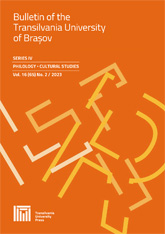"Marked as seen" – Considerations on role ambiguity in social media
"Marked as seen" – Considerations on role ambiguity in social media
Author(s): Eugen IstodorSubject(s): Language studies, Language and Literature Studies
Published by: Editura Universitatii Transilvania din Brasov
Keywords: social media; humour; cynicism; ethics; free will;
Summary/Abstract: A past participle of the verb “to see” refers to an ambiguous situation in social media. “Your crush marked you as seen!” is a language hybrid encountered on the internet, with two English words poured into a Romanian expression. A pun copied after a Romanian folk saying is, in posthumanism (Braidotti 2016) a representation and symbolising formula (Todorov, apud Răutu 2021). A pun, but without humour, more like a cynical ascertainment (Iftode, Voinea 2016) that imposes a sociological research, in which linguistics, communication sciences, and behavioural psychology can bear adequate witness. We’ll analyse the phrase “marked as seen” in social media contexts and the explanations of those involved. We’ll try a linguistic explanation as to its formation and we’ll establish borders and resemblances with similar phrases in Romanian. Then, starting from details and general characteristics of virtual communication, we shall observe the community implications, the emotional participation rate the depression signs, and the marginalisation status. A simple question is asked in the communication field: Is “marked as seen” a limit of the virtual communication system automatization? Also, is “marked as seen” a point of view towards the ethics conceived by Ricoeur (1994)? “Our interpretation mediated by the ethic evaluation of our actions”. The dramatization through denial and the confession of the nude truth that hides untruths (Sloterdijk 2000) sends towards the idealism and the fragility of social media relations. In a territory of efficient communication, “marked as seen” creates behavioural breaks. In an area lacking “free will” (Lernier 2018), there is an inadequacy between technology and the individual. Where there is a supremacy of automatisms (Lernier 2018) individual will or disregard creates ambiguity. “Marked you as seen” can be, despite the “cancel culture” statements, at least a community gesture of post-humanity explained with the means of modernity.
Journal: Bulletin of the Transilvania University of Braşov, Series IV: Philology & Cultural Studies
- Issue Year: 16/2023
- Issue No: 2
- Page Range: 39-44
- Page Count: 6
- Language: English

